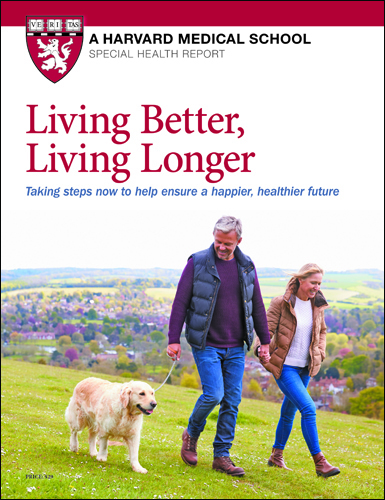Getting the most from your remaining years
Focusing on quality of life helps men stay active, healthy, and happy.
- Reviewed by Howard E. LeWine, MD, Chief Medical Editor, Harvard Health Publishing; Editorial Advisory Board Member, Harvard Health Publishing

The average healthy 65-year-old man can expect to live about 18 more years, or approximately 6,500 days, according to some estimates. So how do you want to spend that remaining time?
"Doing the right things like exercising and eating a proper diet can help you live a longer, healthier life," says Ronald Siegel, an assistant professor of psychology with Harvard Medical School and medical editor of the Harvard Special Health Report Positive Psychology. "But the ultimate goal is not just to live longer, but to enjoy and find meaning in life, which means placing more emphasis on quality of life."
Defining quality
High quality of life is difficult to define or measure, as it has different meanings for different people, but a study published online March 8, 2019, by PLOSOne made an attempt. Researchers examined survey responses from 3,400 older adults about quality of life. Here is what respondents found most important:
Autonomy: staying independent, retaining dignity, and not feeling like a burden.
Valuable activities: spending time doing what brings joy, value, and meaning to life.
Relationships: maintaining bonds with friends and family.
Attitude and adaptation: looking at the glass as half-full.
Emotional comfort: feeling at peace, calm, and free of worries.
Spirituality: experiencing faith and self-development through beliefs, rituals, and inner reflection.
These are only examples, but they can offer guidance in creating your own definition of life quality. Still, Siegel says the foundation for a high quality of life is often built around certain mindsets and habits: a sense of purpose, connecting with others, and enjoying the process and journey. "They can help you find sustainable paths to well-being, and help change your behaviors and habits in order to embrace and enjoy this new phase of living."
Cultivating purpose
A strong sense of purpose means a desire to continue pursuing goals, feeling life is worthwhile, and having a general enthusiasm for living. "Without a defined sense of purpose, men can feel lost and empty," says Siegel. In fact, research has shown that older adults with a defined sense of purpose are more active and have lower risks of heart disease and early death.
Your life's purpose is more than just finding something to occupy your time. It's about pursuing goals and interests that center on self-development, growth, and connecting with others, says Siegel.
"Instead of focusing on what previously defined you, look at who you are now, where your interests lie, and where you may find the greatest sense of joy, meaning, and engagement," he says. "Embrace this self-reflection as an opportunity for adventure and discovery."
You might revisit interests you put aside in the past or embrace something you have always wanted to explore. For example, learn a musical instrument, volunteer for a favorite cause, or take online or in-person classes in subjects you now find stimulating, such as history, writing, or science. Or focus on developing new skills, like public speaking, cooking, or auto repair.
Connect with others
The ongoing Harvard Study of Adult Development, which tracks men's physical and mental health changes over their lifetime, has found that high-quality relationships are essential for long-term well-being. "To live well, we need to connect with our friends, family, and communities," says Siegel. "So look for activities that help you feel closer and more trusting with others."
Attitude adjustmentMost men have spent their early life in a recurring cycle of achieving and proving themselves. "This was how they felt good about themselves, but this struggle to maintain self-esteem through achievements is less sustainable as men age," says Ronald Siegel, an assistant professor of psychology with Harvard Medical School. "Their career is behind them, the kids are grown, and they now have nothing to fill those voids." He says that redefining quality of life is an opportunity for men to break away from that competitive mindset, and from constantly comparing themselves to others. "This can provide the freedom they need to find more enduring sources of meaning and well-being and help them see that life quality doesn't have to revolve around accomplishments." |
Go with the flow
A high quality of life doesn't always involve reaching a goal. "The process and journey are often where the enjoyment lies," says Siegel.
Central to this experience is a state of mind known as "flow." Flow occurs when people engage in the highest levels of enjoyment doing activities. During periods of flow, people are in a heightened state of attentiveness, work effortlessly, feel in control of their actions, and — perhaps most important — are not focused on the end results.
"People who experience flow live more in the present moment, judge themselves less, and are generally happier," says Siegel.
Flow happens more readily when there is a balance between an activity's challenge and your skill in performing it. Make mental notes about how you feel while pursuing quality-of-life activities.
"The exercise can help you adjust activities to reach a state of flow as well as gauge whether your pursuit is something that provides the joy and satisfaction you seek," says Siegel.
Image: © Rawpixel Ltd./Getty Images
About the Author

Matthew Solan, Executive Editor, Harvard Men's Health Watch
About the Reviewer

Howard E. LeWine, MD, Chief Medical Editor, Harvard Health Publishing; Editorial Advisory Board Member, Harvard Health Publishing
Disclaimer:
As a service to our readers, Harvard Health Publishing provides access to our library of archived content. Please note the date of last review or update on all articles.
No content on this site, regardless of date, should ever be used as a substitute for direct medical advice from your doctor or other qualified clinician.
















